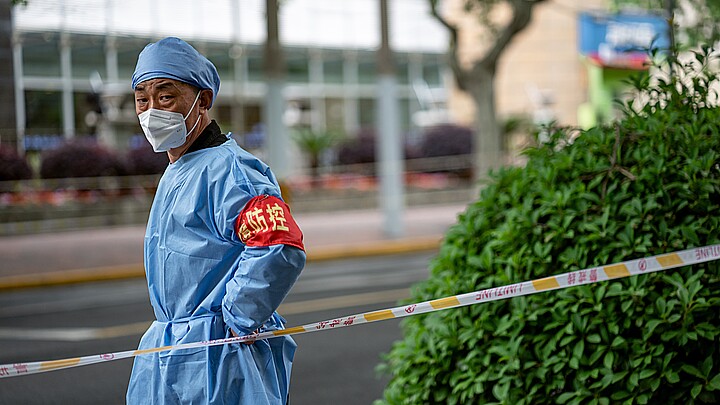Coronavirus
Beijing residents empty stores amid fears of new COVID-19 lockdowns
On Sunday, authorities in Chaoyang – home to 3.45 million people – ordered residents and commuters to get tested three times this week as health officials warned that the virus had “stealthily” spread across the community before finally being detected
April 25, 2022 11:06am
Updated: April 25, 2022 1:46pm
Residents in Beijing’s largest district rushed to stock up on groceries and other essentials after a government mass COVID-19 testing order stoked fears that a lockdown is once on the horizon in the Chinese capital.
On Sunday, authorities in Chaoyang – home to 3.45 million people – ordered residents and commuters to get tested three times this week as health officials warned that the virus had “stealthily” spread across the community before finally being detected, Reuters reported.
Fearing that they could face a similar lockdown to the one in Shanghai – which recently entered its fourth week – shoppers in Beijing crowded grocery stores, markets and online platforms to stock up on meat, instant noodles, vegetables and toilet paper.
According to one 63-year-old Chaoyang resident, “Shanghai was a lesson.”
But as customers rush to buy food in bulk, officials from supermarket chains like Carrefour and Wumart have said that their Beijing locations had more than doubled inventories.
Chinese stocks, however, have dropped to two-year lows as concerns of another Beijing outbreak has worried investors – in part because new research published by Gavekal Dragonomics on Friday has shown that upwards of 57 out of China’s top 100 cities by economic output had “relatively tough” pandemic restrictions in place last week.
Beijing’s case load appears to be small compared to other cities across China and the world, however, and most Chaoyang schools, stores and places of business are expected to remain open.
In Shanghai, on the other hand, increasingly tough restrictions are still widely enforced.
"Every compound, every gate, every door must be strictly managed," said Qi Keping, vice-head of Shanghai's northeastern commercial district of Yangpu, adding that a more targeted was being considered in order to “better achieve differentiated prevention.”
This past weekend, police in hazmat suits could be seen patrolling the streets and setting up roadblocks as health officials and government authorities sealed off the entrances to many public housing blocks and erected two-meter-tall wire mesh fences in order to block off entire residential streets – a move which brought thousands of Shanghai residents out to their balconies to protest the measures.
Protests in Shanghai. The police was called. It didn't matter. People didn't stop pic.twitter.com/Ks1r4OCLrs
— Rodrigo Zeidan (@RodZeidan) April 23, 2022
Although officials have said they have relaxed some measures, most Shanghai residents are still confined to their homes or are unable to leave their residential compounds after the city government reported 51 new COVID-19 related deaths on April 24 – marking the highest daily toll to date and raising the official figure to 138.
The day before the new death toll was reported, local asymptomatic cases fell to 16,983 from 19,657 and symptomatic infections rose to 2,472, from 1,401.
Since Friday, there have been 70 locally transmitted cases reported in eight of Beijing’s 16 districts – with Chaoyang accounting for 46 of them.







